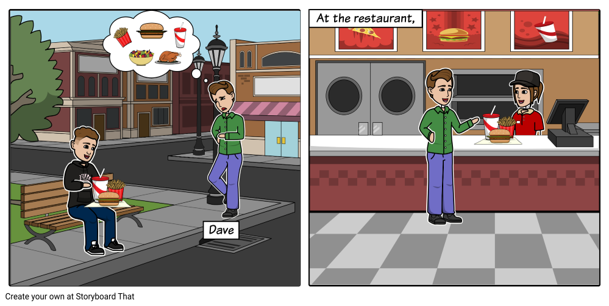LESSON GOAL
Let’s check our lesson goal.
In this material, you will learn the words and phrases that are related to fast food and dining out.
In this material, you will learn the words and phrases that are related to fast food and dining out.
この教材では、ファストフードや外食に関する語彙や表現を学びます。
PART A_1
Fill in the missing letters of the word to complete each sentence. Read the meaning aloud and use it as a clue.
PART A_2
| 1. word: |
B
_
O
C
_
|
| meaning: | [noun] area with streets on all sides |
| sentence: | There is an Italian restaurant a _______ away from here. |
| 2. word: |
_
F
F
O
_
D
A
B
_
E
|
| meaning: | [adjective] not expensive |
| sentence: | They’re serving delicious and ________ hamburgers here. |
| 3. word: |
S
_
A
R
V
_
N
G
|
| meaning: | [adjective] very hungry |
| sentence: | Let’s go grab some breakfast. I’m _________. |
PART B_1
Let’s read the dialogue. I will play Ron and you will play Emma. Then, we’ll switch roles.
PART B_2

I’m so hungry. Do you want to join us for lunch, Emma? We’re going out.
|
Sure. I forgot to bring my lunch today. Where are we going to eat? |

We’re planning to go to the fast food restaurant just two blocks away from here. I heard they serve delicious and affordable hamburgers.
|
That sounds nice. I don’t usually eat fast food, but I am curious about their hamburgers. I might try them as well. How often do you eat fast food? |

I just eat fast food once or twice a month because I’m trying to lose weight. What fast food do you like eating?
|
I love French fries and hotdogs. When I was younger, my mom used to buy me those foods after school. Now, I realize that those foods are unhealthy, so I just eat them once in a while. |

That’s good. I also like fast food when I was younger. We really need to eat healthy food, now that staying fit is difficult. After all, “you are what you eat”.
|
I agree with that, Ron. Anyway, we shouldn’t keep them waiting. Let’s go. I’m starving! |
PART B_3
Please answer the questions in complete sentences.
PART B_4
| 1. | Where are they going to eat for lunch? |
| Answer: | |
| 2. | Why does Emma only eat fast food once in a while? |
| Answer: | |
| 3. | Does Emma like to eat fast food now? |
| Answer: | |
| 4. | What does Ron mean by “you are what you eat”? |
| Answer: |
PART C_1
Study the pictures for 1 minute. Tell a story based on the pictures.
PART C_2

PART D_1
Please answer the questions by stating your opinions.
PART D_2
| 1. | Many people believe that fast food, soda, and sweets should not be sold in school cafeterias. Do you agree or disagree? |
| Answer: | |
| 2. | If fast food were free in your country, would you eat it every day? |
| Answer: |
PART E_1
Let’s talk. Please answer my questions.
PART E_2
| 1. | How often do you eat fast food? What is your favorite fast food? |
| Answer: | |
| 2. | Do you prefer bringing home-cooked lunch or eating out when you are at work (or in school)? |
| Answer: | |
| 3. | How is the food in your work (or school) cafeteria? |
| Answer: | |
| 4. | What are the common fast food in your country? Are they affordable? |
| Answer: | |
| 5. | Some people say that we (humans) are less healthier now because of the popularity of fast food? Do you agree or disagree? |
| Answer: |
REVIEW AND FEEDBACK
Now, let us review the things that you learned in this lesson.
ではこのレッスンで学んだことを振り返りましょう。
(Please give a short feedback on how your student did on your class.)
| Grammar 文法 |
Pronunciation 発音 | Vocabulary 単語 |
Comprehension 理解 |
|
|---|---|---|---|---|
 GOOD GOOD |
文法の誤りはほとんどなく、完全な文章で話すことができる | ほとんどの単語をはっきりと正しく発音することができる | 習った表現を適切に使うことができる | 文章を理解し、質問に正しく答えることができる |
 FAIR |
文法の誤りはあるが、完全な文章で話すことができる | 発音の練習が必要な言葉がいくつかある | たまにミスはあるが、習った表現を適切に使うことができる | 文章を完全に理解するのは難しく、質問に正しく答えられないときもある |
 POOR |
文章で話すのは難しく、単語だけで話すことができる | 発音の練習が必要である | 習った単語と表現を少しだけ使うことができる | 文章を理解するのは難しく、質問に答えるのは難しい |
レッスン教材に関するアンケートのお願い
レッスン教材の改善・拡充を図ることを目的とし、アンケートを実施しております。
以下のURLからアンケートにお答えいただき、 ご意見・ご要望をお聞かせください。
アンケートはこちら